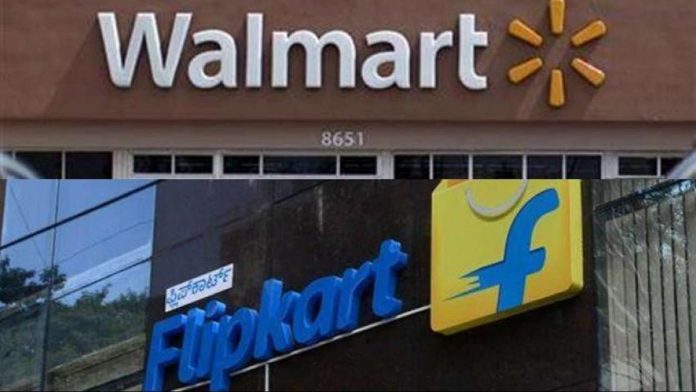This article is written by Vanya Verma from the Alliance University, Bangalore. This article talks about the key elements of the Flipkart-Walmart deal and their positive and negative impacts on the Indian economy.
Introduction
The Flipkart-Walmart deal will benefit Flipkart to give leverage to Walmart single-channel knowledge and expertise supply chains in the market. In the retail market, Walmart has been able to establish a positive reputation but not in the e-commerce market and by signing this deal it will strengthen its market reputation in the e-commerce sector too. Both Walmart & Flipkart will be having different operating structures and separate brands in the market.
A brief about Flipkart
Flipkart was launched as an e-commerce website in October 2007. Earlier it was retailing only with books, and then slowly afterwards in 2010 it started launching new portfolios like movies, music, and mobiles, and in 2012 with fashion and lifestyle. Flipkart was founded by Helion Venture Partners and Junglee in 2008. Flipkart raised $190 million in four years that is from 2009 to 2012 from the well-known venture capitals in the market like Tiger Global and Accel Partners. In the same year, Flipkart changed its business model from directly selling goods to the customers to a marketplace model. Then in the same year, i.e. 2012, Flipkart raised $150 million from Naspers which was an internet major of South Africa.
By 2013, Flipkart was being contemplated as a successful startup and by mid of the year 2013, further $200 million were raised by the Flipkart from its already existing investors and $160 million from investors like Vulcan Capital, Morgan Stanley, etc. Flipkart’s valuation was $1.6 billion by the end of 2013. In 2014, Myntra got acquired by Flipkart. By the end of 2014, Flipkart’s valuation was $11 billion after it raised huge amounts from Greenoaks, GIC Singapore, etc. and by the end of 2015, it was $15.5 billion, after it raised $700 million from its existing investors. However, from 2016 onwards the business of Flipkart has not been very profitable as the investor Morgan Stanley had started cutting to the value of the share of the company, due to which by the end of 2016, the valuation of the company fell to $5.6 billion.
A brief about Walmart
Walmart is an American multinational retail corporation which also has its retail branches in India. Walmart has established various hypermarkets, grocery stores, and discount shops all over the country. Walmart is the largest e-commerce market which has acquired 77% stake by investing $16 billion in Flipkart. “Walmart India”- Wal-Mart India Private Limited is an entirely owned subsidiary of Walmart Inc., which is the world’s leading retailer, well-known for its expertise and efficiency in supply chain management, logistics, and sourcing.
Back in 2007, Walmart made an entry in India through a joint venture with Bharti Enterprises. It opened its first store on 29th May 2009 in India in Amritsar, Punjab. In 2013 Walmart India became a wholly-owned subsidiary of Walmart Stores. Currently, 21 Cash & Carry stores are owned and operated by Walmart India in 9 states across the country, that is under the brand name of Best Price Modern Wholesale Stores (“Best Price”). Their business in India is based on membership and they have more than one million members, out of which majority are small resellers (mom & pop stores). The other business segments that are members of Walmart are restaurants, hotels, offices, and institutions, which is supported by Walmart with high-quality products at competitive, consistent and transparent prices for the prosperity of the business.
Key facts about the deal
- Finally, after trying for more than 15 years, Walmart managed to penetrate the Indian market. The Indian e-commerce landscape till now was dominated by two firms that are Amazon and Flipkart but it is determined that Walmart-Flipkart deal will change the scenario.
- Competition Committee of India (CCI) approved the proposed acquisition of the Bengaluru based Flipkart Private Limited by Walmart International Holdings Inc. 77% controlling stake in Flipkart was acquired by Walmart for $16 billion in 2018 and making it as the biggest e-commerce deal in the world. The residues will remain with its earlier investors which includes Flipkart’s co-founder Binny Bansal, Tiger Global Management LLC, Microsoft Corporation and China’s Tencent Holdings Ltd.
- The entry of Flipkart into Walmart substantiates the capability of the Indian retail market. After this deal, in the Indian e-commerce market, there will be a tough competition between Amazon, Walmart and Paytm Mall.
- This deal can help Flipkart leverage Walmart’s omnichannel retail skill and comprehensive supply chain information.
- The aim of Walmart through this acquisition is to extend its B2B (Business to Business) sales across India.
- Vice-Chairman of NITI Aayog, Rajiv Kumar announced that there will be a positive impact by the Walmart-Flipkart deal on India’s foreign investment inflows as per the norms of India’s Foreign Direct Investment (FDI).
- Doug MacMillan, CEO of Walmart said that in his opinion, India is one of the most remarkable retail markets in the world (contemplating how it managed to become Amazon of India). This deal of Walmart with Flipkart is to commend the company’s prominent role in revamping the Indian marketplace. According to MacMillan, this deal might also help Flipkart to achieve its goal of being a publicly listed company.
- This deal will help Flipkart, not just with profits but will also create an opportunity for Flipkart to expand its market beyond fashion and smartphones. Amazon in the year 2017 got approval to function in grocery and perishable food items, in which Flipkart was lagging behind till now. With the help of this deal, Flipkart can now re-furnish its system using the expertise of Walmart in running offline stores, access to manufacturers and sellers, supply chain and also a chance to enter into the grocery sector.
- Through this Flipkart-Walmart deal, Walmart will leverage e-commerce market presence of Flipkart in the country with an active base of 54 million customers. Walmart till now was able to retain powerful global physical existence for years only in retail space but lacked e-commerce space till date. This deal will stimulate both the presence of offline Flipkart and Walmart’s online presence in India as for now both have aimed at maintaining distinct brands and operating structures.
- Amazon dominance in the e-commerce industry in India will come to an end with the Walmart-Flipkart deal. This deal will create more competition in the market to attract more customers which will lead to additional advantages for the customers. The competition will create diverse products and bring in more selection options at low prices to the customers.
- Further, the principal beneficiary is the farmer. The purpose as to why Walmart challenged Amazon is because Walmart has a leading edge in taking fresh farm produce with the help of sophistically developed cold chains and this is lacking in Amazon. This will also help in preventing the losses that are caused due to the spoiling of a significant percentage of fruits and vegetables because of insufficient logistics and warehouses.
- Ajay Srinivasan, Director of CRISIL Research, also asserted the same saying that “The deal indicates India’s consumption market attractiveness for the global majors”. With Walmart acquiring a stake in Flipkart, we expect an enhanced thrust in the segment of online grocery. We expect that online grocery will be the fastest-growing segment in the e-retail space, growing at the rate of 65-70 per cent to touch Rs 10,000 crores in revenues by 2020.”
Why was Flipkart acquired by Walmart?
- According to Morgan Stanley, India’s online retail will grow to 1,200%, $200 billion (30% CAGR) by 2026 from $15 billion in 2016. The average wages are rising by 2% annually and there is even growth in internet penetration as data costs are becoming more competitive, which makes the Indian e-commerce space more lucrative.
- In e-commerce, Flipkart has the largest market share, so with the help of this acquisition, it will be easy for Walmart to achieve the next leg of growth in India with the Flipkart’s 175 million registered user base.
Positive impact of acquisition on Indian Economy
- Employment: Walmart is popular for its practice of innovation and service. It is being expected with revamping of new business models, because of that, the Indian e-commerce market will witness extensive growth with improved productivity. The employment opportunities will increase with the rise in productivity for both skilled and unskilled labour that will result in economic growth and capitalism.
- Collateral Benefits: The e-commerce market after demonetization and GST faced a major slow down. This deal will direct brand new funds and rejuvenate the Indian e-commerce market. More foreign firms and venture capitalists will be attracted to enter India as it is the world’s largest giant pour funds.
- Low prices, more variety: As there is a competition among the e-commerce giants to be at the top, the localization and differentiation of products will give rise to more variety and develop a diverse product market at low prices in order to attract the customers which shall eventually prove beneficial for the customers.
- Research and Development: In order to have a greater market penetration across the country, the key element is efficiency which is a result of research and development. Walmart is well known for its culture of service and innovation, this will help it to grow and scale up the business in India, in order to generate more revenue and in creating technological spillovers and learning effects for the domestic firms as well. The external demand for Indian goods will increase because of the refined nature of the products.
- Efficient Supply Chain: The expansion of e-commerce business requires a valuable supply chain and logistics that needs infrastructural development. This will give a fillip to the Indian infrastructure and agriculture and also benefit the farmers, as well as, they would be able to provide more demand as Walmart has extensive experience in logistics, retailing, inventory and supply chain management. This can particularly help the perishable goods business which is Walmart’s forte.
- Economic Growth: Walmart will expand its business across the country which will stimulate output growth and increase employment opportunities. With optimistic business attitudes, it will be a stimulus to economic growth and capitalism. Further, this deal will be subjected to tax leading to a surge in domestic revenue gains.
- ESOPS (Employee stock option Plan): Many existing employees will make windfall gains from their stock options through this deal. This will increase the entry of more workers in the e-commerce sector who had earlier left due to the downturn and can also assimilate labours from the traditional and old brick-and-mortar industries that can benefit in formalisation of more of the Indian labour force.
- Mom and Pop stores: Walmart is looking forward to extending its supply chain arm with the help of partnerships with around 60 lakhs kiranas. This partnership will increase the presence of Walmart in the small stores.
- Premji Invest is anticipated to gain up to four times from the Flipkart-Walmart deal as its share in Myntra (bought by Flipkart in 2014) has also been acquired by Walmart. It has been anticipated that the gains will be more than $130 million on the $25 million investment. This will bring an inflow of more funds pouring in the Indian economy as profits attract investors from India and other countries.
Negative impact of the acquisition on the Indian Economy
- Big data mining: Even though Walmart-Flipkart seems very profitable for the Indian economy, still the deal witnessed some warnings and protests from trade unions, retailer associations and also political organizations. They are worried about the fact that as of now India does not have any national e-commerce policy or a regulatory body for e-commerce. Ample information and data of the Indian clients including their personal details, search history, purchasing history, etc can go under the control of the US company. This can be exploited by personal stakes like the one which happened in the recent Facebook-Cambridge Analytica case too. Thus, there is a requirement to keep a system of checks and balances in order to avoid any issue of data breach of the Indian customers.
- Impact on sellers: The biggest retail deal in the world between Walmart and Flipkart will influence the whole segment of the competitors and consumers. Where a customer is the master, the Flipkart’s online sellers are worried about the fact that Walmart would clear them off as it has an image of slaughtering the independent small companies with ultra-low costs. It is being expected by the smaller businesses that Walmart might get its own private labels and brands with the help of Flipkart to provide to the Indian customers that will lead to extra pressure upon them. The products could be brought at hyper-competitive costs, that will create a problem for other sellers and rip off the market.
- Brick and Mortar Stores may shut down: The small businesses that sell at ultra-low prices through Flipkart are being scrapped by Walmart. Chances are that Walmart may replace the domestic MSMEs with its own labels having the hyper-competitive prices, this can result in a threat to brick and mortar stores as they already fear of being shut down due to the competitive pressure.
- The ruining of small players: Small Players (Mom and Pop stores) will be ruined by this as due to such high competitions, the market spaces shrink and ultimately forcing the small firms to exit from the market. To survive, the firms try to excessively cut the price rate at the cost of profitability and viability which drives to inefficiency.
- Threat of Pan India Protests: The government has already been warned of the pan India protests by the Tamil Nadu Vanigar Sangankalin Peramaippu federation of traders. It is estimated that many more such trade unions might call for protests which will eventually hurt our economy, cause infrastructural damages resulting in social chaos.
- Backdoor entry for Walmart: Foreign Direct Investment (FDI) in single-brand retail allows 100% FDI in India. 100% FDI is not permitted in Walmart as it is a multi-brand retail chain, so it concentrates only upon cash and carry business. Flipkart has already avoided such restrictions in direct selling which will be utilised by Walmart.
Conclusion
Flipkart and Walmart, both will be profited by this deal. The level of investment will be increased as it will give a surge to further investment by foreign firms in the Indian market. This deal will boost the level of competition in the e-commerce sector. Walmart, as being one of the biggest retail markets, penetrating into the world of e-commerce will unlock new doors for the labour class by providing them employment. The deal will allow the offline market players to alter their business model and to modify the tools and techniques in order to yield better profits in the e-commerce market. The success of Flipkart under Walmart would confide on how it is able to effectively execute a world-class supply chain in India, amidst all the challenges in the Indian context. The economy of India will witness a rising graph with more investments. But to avoid exploitation and to maximize benefits, efforts should be made in order to bring uniformity in the marketing structure of e-commerce.
References
- https://www.mbauniverse.com/group-discussion/topic/business-economy/walmart-and-flipkart-deal
- https://www.iloconsulting.in/knowledge-center/walmart-flipkart-deal-impact-indian-economy
LawSikho has created a telegram group for exchanging legal knowledge, referrals, and various opportunities. You can click on this link and join:
 Serato DJ Crack 2025Serato DJ PRO Crack
Serato DJ Crack 2025Serato DJ PRO Crack










 Allow notifications
Allow notifications


